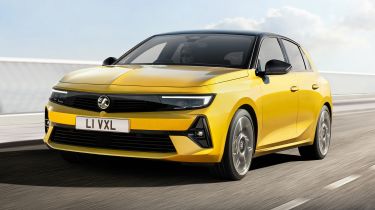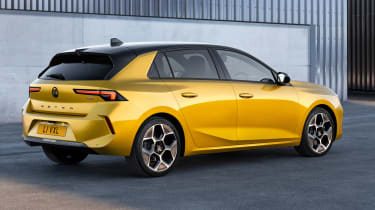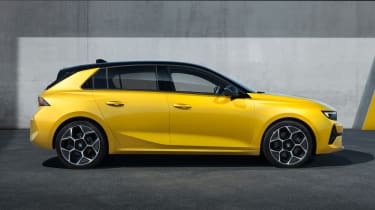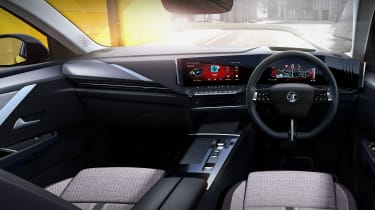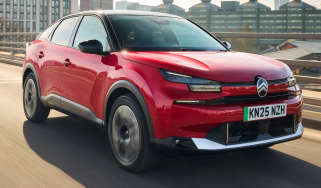All-new 2022 Vauxhall Astra on sale now with a price of £23,275
New Vauxhall Astra arrives with brand’s ‘Vizor’ face, new technology PHEV powertrains and a fully-electric model
- Eighth-generation Astra gets brand’s ‘Vizor’ face and plug-in hybrid powertrain
- Features Vauxhall’s latest ‘Pure Panel’ digital dashboard technology
- Starting price of £23,275, with electric Astra-e to follow in 2023
The new Vauxhall Astra was revealed earlier this year and Vauxhall has now confirmed the car is available in three trim levels called Design, GS Line and top-spec Ultimate. The new model is available to order now for £23,275, with first deliveries scheduled for early 2022.
 The top 10 best family cars 2025
The top 10 best family cars 2025
Vauxhall has already confirmed the new eighth-generation Astra would be available with a choice of petrol, diesel and range-topping plug-in hybrid (PHEV) powertrains at launch. It sports a bold new design with the brand's ‘Vizor’ grille and an array of upgraded technology. The new model faces fierce competition in the mid-size family hatchback sector from recently updated rivals such as the Ford Focus, Peugeot 308, SEAT Leon, Skoda Octavia and the Volkswagen Golf.
A pure-electric Astra-e will arrive in 2023 and will be the first electric version of the model in its history. It will be the third electric model in Vauxhall’s lineup, alongside the Mokka-e and Corsa-e, and will form a part of the brand’s ongoing strategy to offer a fully electrified lineup by 2028.
2022 Vauxhall Astra: pricing, specifications and trim levels
The new Vauxhall Astra is initially available in three trim levels. The range starts with the Design model, which has a starting price of £23,275. Standard equipment includes 16-inch alloy wheels and LED lights. Inside, Vauxhall’s Pure Panel setup consists of a 10-inch digital dial cluster and a 10-inch infotainment touchscreen with sat nav, Apple CarPlay and Android Auto. A decent amount of safety kit is standard too, including automatic emergency braking (AEB), lane departure warning and rear parking sensors.
GS Line is the mid-range trim and has several sporty styling touches, including black 17-inch alloy wheels, black badges, two-tone paint and tinted rear windows. It also gets an AGR-certified drivers seat, which Vauxhall says offers improved comfort and support over the regular version. Other additional features include heating for the front seats and gearshift paddles for automatic models. You also get active cruise control, front and rear parking sensors and a 360-degree camera. Prices for the GS Line model start from £26,170.
At the top of the new Astra lineup, the Ultimate model has more luxury features and upgraded technology. Larger, 18-inch diamond cut alloys are standard, along with upgraded Pixel LED headlights and a sunroof. Both the driver and passenger seats are AGR-certified, while Alcantra upholstery also features. Technology upgrades include a head-up-display, a heated windscreen, a wireless charging pad and Vauxhall’s ‘Intelli-Air’ connectivity, which allows owners to control certain in-car functions via a smartphone.
Ultimate models also have rear cross traffic alert and driver assistance features including semi-autonomous lane change assist and curve speed adaptation, which automatically adjusts the car's speed as it approaches a corner when the semi-autonomous drive mode is engaged. Prices for the Ultimate trim start from £29,285.
Engines, performance and platform
The new Astra sits on the same underpinnings as the latest Peugeot 308 and shares several of the same engines.
At the top of the range, a pair of PHEV powertrains are offered. Both combine a 1.6-litre petrol engine with an electric motor, producing 178bhp or 222bhp respectively. Vauxhall claims the lower-powered 178bhp model manages 0-62mph in 7.7 seconds and a top speed of 140mph, with the 222bhp version taking 7.5 seconds and a slightly higher top speed of 146mph.
According to Vauxhall, both PHEV powertrains are capable of up to 35 miles of pure-electric running from a 12.kWh battery. Official fuel economy ranges from 201.8 to 256.8mpg with CO2 emissions of 24-27g/km. Every PHEV version of the Astra is front-wheel drive with an eight-speed automatic gearbox.
Stick with conventional engines, and a 1.2-litre turbocharged petrol engine is also available alongside a 1.5-litre diesel. The petrol range starts with the 108bhp version, which manages fuel economy of up to 52.3mpg and emissions of 123g/km when equipped with a six-speed manual gearbox. Above this, the 128bhp petrol is officially capable of up to 52mpg and emissions of 123-130g/km with a manual. An automatic gearbox is also available with this engine, dropping fuel economy to 51.4mpg.
The diesel engine produces 128bhp and is only available with an automatic gearbox. Officially, the diesel Astra can achieve a claimed maximum of 64.3mpg with emissions of 114-121g/km, making it the eco-champion of the regular Astra line-up.
2023 Vauxhall Astra-e
The electric Vauxhall Astra-e will go on sale in 2023, joining the existing Corsa-e and Mokka-e in the brand’s electric line-up. While full details have not yet been announced, it’s likely the Astra-e will use the new Stellantis SLTA Medium platform and a 60kWh battery giving it a range of around 250 miles between charges. Externally, the model is likely to retain the same styling as the regular versions, aside from the addition of a charging port and aerodynamic alloy wheels.
Design and styling
The biggest change for the eighth-generation Astra is the new nose, which features the ‘Vauxhall Vizor’ design. This features a smoothed-off front grille panel and upswept LED headlights that are designed to blend seamlessly together into one continuous panel spanning the front of the car.
At the rear, Vauxhall has added ‘Astra’ badging across the tailgate, along with a new angular rear bumper.
Interior and technology
The interior of the new Astra has undergone a complete redesign, borrowing all of the technology from the new Mokka. This includes the brand’s Pure Panel dual-screen infotainment setup with a pair of 10-inch displays for the digital dial cluster and infotainment screen, which are housed in a single trim surround to make it look like one large continuous digital display.
Elsewhere, the redesigned dashboard features fewer physical controls than the old car, with essential functions like the climate control now operated via the touchscreen. A new steering wheel also features, with a three-spoke design and a new control layout on each of the left and right spokes.
Driver assistance tech has also been upgraded, with a total of four cameras dotted around the car’s bodywork and a series of radar and ultrasonic sensors. This is all operated via Vauxhall’s IntelliDrive safety suite, which can accelerate and change lanes with driver supervision. In models equipped with an automatic gearbox, the system can bring the car to a stop and set off in traffic.
Practicality and dimensions
According to Vauxhall, the new Astra has a 13mm longer wheelbase (the distance between the front and rear wheels) at 2,675mm. This means it should be more spacious in the back, with more space for rear passengers. Overall, the new car measures in at 4,374mm long and 1,860mm wide. The boot measures 422 litres, which is 41 litres more than a VW Golf.
Read our review of the new Mokka and see where the current Astra features on our list of best used cars and best automatic cars to buy now.
Recommended

SEAT releases new Black Edition models with sportier styling
Most Popular

Suzuki’s new 10-year warranty is free – here’s how to get it

Omoda E5 targets rivals: now with zero deposit and APR
Tips & advice

Car dashboard warning lights: what does each symbol mean?

Electric car charging stations: public networks, charger types, apps and maps


